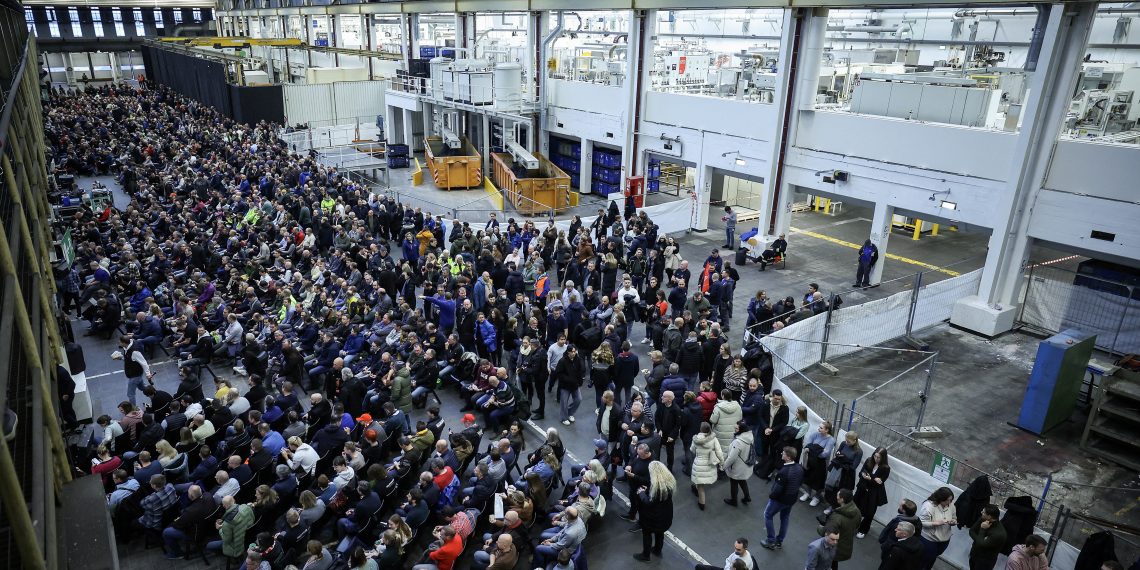Tensions Boil Over in Wolfsburg as Strikes Loom
Volkswagen’s internal conflict reached a fever pitch during a high-stakes staff meeting at its Wolfsburg headquarters on Wednesday. With management pushing for sweeping cost cuts and workers vowing to escalate strikes if plant closures remain part of the plan, the embattled German automaker finds itself at a crossroads.
The meeting, attended by 20,000 workers and German Labour Minister Hubertus Heil, laid bare the growing rift between Volkswagen’s leadership and its workforce. The fourth round of wage negotiations is set for December 9, with unions warning of intensified action if no resolution is reached.
CEO Blume: “We Must Secure Volkswagen’s Future”
Volkswagen Group CEO Oliver Blume defended management’s proposals, which include plant closures and pay cuts, as essential for survival in an industry under siege.
“We are making decisions in a rapidly changing environment,” Blume said, pointing to mounting competition from Chinese automakers and the pressure to recover lost ground in the EV market. “The price pressure is immense. Labour costs in Germany are too high to compete.”
Blume’s remarks were repeatedly interrupted by boos from workers, signaling widespread dissatisfaction. Despite sharing his personal ties to the Wolfsburg region, Blume’s appeals for understanding were met with skepticism.
“We urgently need to take measures to secure the future of Volkswagen,” he warned, emphasizing the automaker’s struggles in China, its largest market, and the broader European car sector’s turmoil amid slow EV adoption.
Labour Council Fires Back: “No One Exempt from Sacrifices”
Volkswagen’s labour council, led by Daniela Cavallo, has drawn a clear line, rejecting plant closures and forced layoffs outright. Cavallo accused Blume of disengagement and called for a fairer distribution of sacrifices among management, shareholders, and workers.
“Compromises hurt, but they must apply to all sides,” Cavallo said. “Otherwise, it’s not a compromise.”
Union officials have signaled their willingness to negotiate but remain steadfast in their opposition to plant closures, describing them as a “red line.”
German Labour Minister Joins the Fray
Labour Minister Hubertus Heil weighed in during the meeting, urging both sides to avoid closures or forced layoffs. He highlighted the broader stakes for Germany’s industrial sector, which is grappling with weakening demand and a precarious EV transition.
“All sides must find a solution that supports investment and avoids job losses,” Heil said, warning that prolonged strikes could harm the already struggling sector.
Strikes Threatened Amid Industry Turmoil
Volkswagen workers staged a first round of walkouts earlier this week and have warned of longer and potentially open-ended strikes if next week’s talks fail. Unions are prepared to ramp up pressure to force management to abandon plans for closures and pay cuts.
The unrest comes as Europe’s car industry faces unprecedented challenges:
- Weakening demand across the continent.
- Lagging EV adoption, forcing automakers to carry high costs on combustion-engine production while investing heavily in electric models.
- Intense competition from Chinese automakers, who are undercutting European rivals with lower prices and government subsidies.
Volkswagen’s Path Forward
The stakes for Volkswagen are enormous. As it struggles to regain momentum in China and navigate a tumultuous European market, the automaker must balance its need for cost efficiency with its responsibility to its workforce.
With shares under pressure and growing unrest among workers, Volkswagen’s leadership must secure a deal that addresses the concerns of all stakeholders. The outcome of next week’s negotiations will not only shape the company’s future but could set the tone for the broader European auto industry’s response to its mounting challenges.










